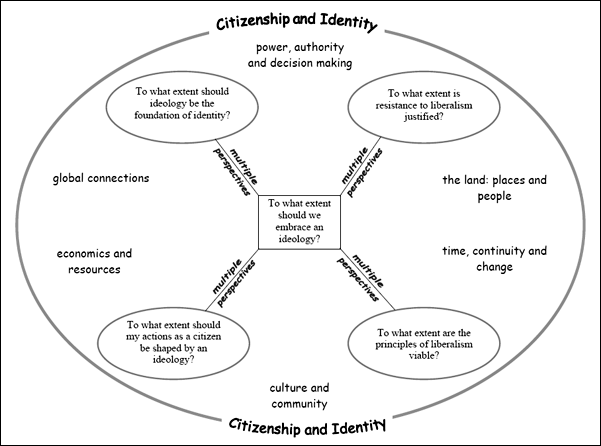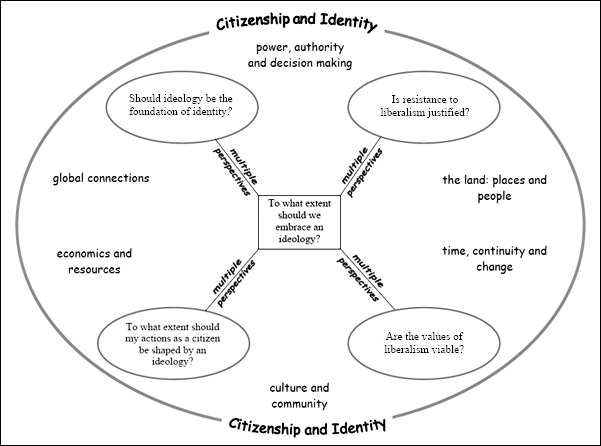| Social Studies | Close this window |
Grade 12 Key Issues
Ideology is the theme of the two sequences in Grade 12: Perspectives on Ideology in 30-1 and Understandings of Ideology in 30-2. For both sequences the key issue is "To what extent should we embrace an ideology?"and thekey outcome is"Students will understand, assess and respond to the complexities of ideologies."

Social Studies 30-1
Students in 30-1will explore the complexities and origins of ideologies by investigating the principles of classical and modern liberalism. Students are required to address four related issues and general outcomes to address the key issue "To what extent should we embrace an ideology?"
Related Issue 1: To what extent should ideology be the foundation of identity?
General Outcome 1 requires students to "explore the relationship between identity and ideology"(GO 1).Students will examine the themes, values and characteristics of ideologies. Students also will analyze individualism and collectivism as foundations of identity.
Related Issue 2: To what extent is resistance to liberalism justified?
General Outcome 2 requires students to "assess impacts of, and reactions to, principles of liberalism"(GO 2). Students will analyze the impacts of classical liberal thought and ideological reaction to it. Students also will analyze how ideological conflict shaped international relations in the postwar world.
Related Issue 3: To what extent are the principles of liberalism viable?
General Outcome 3 requires students to "assess the extent to which the principles of liberalism are viable in a contemporary world" (GO 3). Students will analyze the extent to which political and economic systems reflect the principles of liberalism. They also will evaluate the viability of the principles of liberalism in the context of contemporary issues.
Related Issue 4: To what extent should my actions as a citizen be shaped by an ideology?
General Outcome 4 requires students to "assess their rights, roles and responsibilities as citizens" (GO 4). As students explore how ideology shapes individual and collective citizenship, they will analyze perspectives on the rights, roles and responsibilities of individuals in a democratic society. Finally, students will develop strategies to demonstrate leadership in addressing contemporary issues. They also will explore opportunities to demonstrate active and responsible citizenship.
Social Studies 30-2

Students in 30-2 will examine origins and beliefs about competing ideologies by exploring the relationships among individualism, liberalism, common good and collectivism. They also will analyze the viability of liberalism in historical and contemporary contexts. Students are required to address four related issues and general outcomes in order to address the key issue "To what extent should we embrace an ideology?"
Related Issue 1: Should ideology be the foundation of identity?
General Outcome 1 requires students to "explore the relationship between identity and ideology"(GO 1).Students will examine the themes and characteristics of ideologies. They also will examine individualism and collectivism as foundations of identity.
Related Issue 2: Is resistance to liberalism justified?
General Outcome 2 requires students to "understand impacts of, and reactions to liberalism"(GO 2). Students will explore the values and impacts of historical and contemporary liberal thought and reactions to it. They also will examine how ideological conflict shaped international relations in the postwar world.
Related Issue 3: Are the principles of liberalism viable?
General Outcome 3 requires students to "understand the extent to which the values of liberalism are viable in a contemporary world" (GO 3). Students will examine the extent to which political and economic systems reflect the values of liberalism. They also will analyze and evaluate the viability of the principles of liberalism in the context of contemporary issues.
Related Issue 4: Should my actions as a citizen be shaped by an ideology?
General Outcome 4 requires students to "understand their rights, roles and responsibilities as citizens" (GO 4). As students explore how ideology shapes individual and collective citizenship, they will examine perspectives on the rights, roles and responsibilities of individuals in a democratic society. Finally, students will develop strategies to demonstrate leadership in addressing contemporary issues. They also will explore opportunities to demonstrate active and responsible citizenship.

